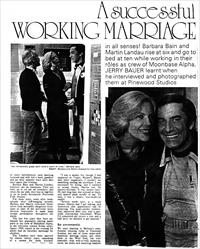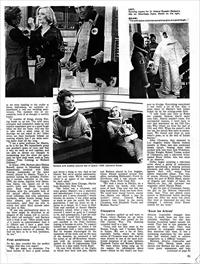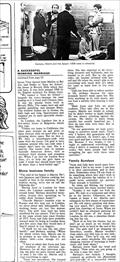UK Press
A Successful Working Marriage
by Jerry Bauer
WOMAN AND HOME (probably 1977); interview with Barbara Bain by Jerry Bauer p64-65, 82
Woman and Home is a UK women's lifestyle magazine, founded in 1926, mostly focused on knitting and cookery.



In all senses! Barbara Bain and Martin Landau rise at six and go to bed at ten while working in their roles as crew of Moonbase Alpha, as JERRY BAUER learnt when he interviewed and photographed them at Pinewood Studios.
IN MANY HOUSEHOLDS, each morning husband and wife bid a hasty goodbye and go their separate ways until they meet again that evening.
Barbara Bain and Martin Landau, however, are an exception. They are both up at six am on weekdays, and when the car calls, they hop in together to go to work, destination: Pinewood Film Studios.
For three years, week after week, episode after cliff-hanging episode, Barbara and Martin extricated them-selves from incredibly dangerous situations as stars of the television series Mission Impossible. It made them instant personalities throughout the world.
The last few years they have enhanced this popularity playing major parts in the crew of Moonbase Alpha, in the television science fiction series, Space: 1999, shown in the evening for adults and on Saturday mornings for children.
The Landaus have been married for almost twenty years, something of a record for show business marriages, and they have two daughters, Susie, who is sixteen, and Julie, aged eleven. But when they first met, in 1955, it was not instant compatibility, as Barbara recalled.
"I was a model, but though I had appeared in Vogue, Harper's Bazaar and other magazines, I couldn't see modelling leading me anywhere. I was fascinated by acting, and I enrolled in acting classes. Martin was the teacher-assistant. It was instant hate! He had long hair, was dressed in black, and looked plain scruffy to me. To him, I was a snooty, over-made-up model.
"Several weeks later, at a small dinner, Martin and I got talking, and discovered that appearances can be deceiving. The pupil-teacher relation-ship improved after this, and a personal relationship blossomed. When I'd completed my course a year and a half later, we decided to get married."
We were chatting in Barbara's comfortable dressing room at Pinewood Studios, not one of those make-shift theatrical dressing rooms one often finds in the West End, but very homelike, with wall-to-wall carpeting, warm tan walls, and matching bamboo furniture. Barbara was curled up on the chaise-longue.
"Our sense of humour is a major factor in our marriage. One morning, as we were heading to the studio at dawn, half-asleep, we suddenly remembered it was our wedding anniversary. The moment was so unromantic, both of us thought it terribly funny."
"A number of things during filming break us up too. The wild space costumes and outlandish make-up and hairdos sometimes give us a good laugh when we first see them. And one has to take with a smile some of the scenes we are asked to do! Other wives see their husbands behind car steering wheels, but I see mine steering space ships all day long."
"I am a great audience for Martin, as he is for me. We immediately grasp one another's point of view, and that is why we work so well together, and are able to devote our energies to assimilating into the show the guest we have each week, such as Joan Collins, Peter Cushing or Richard Johnson."
In Space: 1999, Barbara plays Helena Russell, doctor to Moonbase Alpha, romantically involved with John Koenig, commander of the space base, played by Martin. There is a premise uniting the episodes. Following a nuclear explosion in the year 1999, the moon, together with Moonbase-Alpha, was ripped out of the earth"s orbit and thrust into outer space.
Each week the so-called Alphans, with the invaluable help of the special effects director, must avoid collisions, deal with unforeseen accidents, defeat hostile beings from other planets, and other bizarre occurrences, until they are able to return into orbit. Each episode takes ten days to film.
"If one was philosophical about it, the show might be described as an allegory of the human will to survive. But don't tell anybody," said Barbara with a wink at me. "Most people thought of it purely as entertainment. And it is. Martin and I have a, good time working on it, even though it requires a tremendous amount of stamina. We find we have to be in bed, weekdays, by ten."
So far, they sounded like the perfect couple. Did they ever argue?
"We get angry on occasions. I've been known to have a good scream and throw a thing or two. And so has Martin. But we're worthy adversaries; no one ever wins. We're very equal, which is an aspect of our attraction for each other."
Barbara hails from Chicago, Martin from Brooklyn, New York.
"My father was a wholesale and retail grocer, Martin's was a machinist and manufacturer. I was a quiet, introspective girl. I never dreamed I would become an actress. I was either going to teach or save the world. But after graduation, I had my heart set on a career as a dancer. So I went to New York and. enrolled in dancer Martha Graham's school. After a year, I discovered I wasn't as good as I wanted to be, and consequently, I got the only decent job I could find, modelling."
"Martin went to New York schools and enrolled in the Pratt Institute, hoping to become an artist. To support himself he managed to obtain a job as cartoonist with a daily newspaper. But he became discouraged by the monotony of the work, and on the spur of the moment, he answered a call for actors at an off-Broadway theatre, and with no previous experience, landed the role of highwayman Dick Turpin in a play called North Road."
On tour with Middle Of the Night, in which they both took part, Martin and Barbara played in Los Angeles, where Martin accepted several film offers, including Hitchcock's North by Northwest, and a war picture with Gregory Peck, Pork Chop Hill.
"We took a house in Malibu, on a bluff above the beach, with three acres of land. That year was like one long honeymoon. Susie was born there. We could have stayed forever, except that Martin was offered a part he couldn't refuse: General Rufio, Antony's best friend in the movie Cleopatra, with Elizabeth Taylor and Richard Burton."
The Landaus packed up and went to Rome, where Barbara set up house in an apartment they rented on the Old Cassian Way. The shooting extended itself to a year.
"Susie took her first steps in the Roman Forum, and I became fluent in Italian. We saw a lot of Italy, especially Ischia, where the battle scenes of Cleopatra were shot. And we were witness to one of the most publicised romances of all time, between Elizabeth Taylor and Richard Burton. We were always being rung up by the papers for information about them, which we felt wasn't our business to divulge. Everything considered it was really a lot of fun. Alas, a great many of Martin's best scenes ended up on the cutting-room floor.
"I took Susie and Julie to Rome last summer because they'd never seen Italy. Martin couldn't come. For sentimental reasons, I went back to visit that apartment on the Cassian Way where we lived for part of 1961 and 1962. When the porter"s wife saw me, her mouth flew open in amazement. We kissed and wept in each other"s arms, as in the best of Italian movies."
After Cleopatra, they returned to Los Angeles where Martin worked steadily in films, and also conducted drama classes. Among those who studied with him were Jack Nicholson, Shirley Knight, Robert Towne, author of Chinatown, and a television writer named Bruce Geller, who was more of an observer.
Geller began scripting a television series about a group of undercover agents specialising in helping political prisoners, and other persons detained against their will, escape from almost impossible places. This was, of course, Mission Impossible. Geller wrote the part of Rollin Hand, master of disguise and sleight of hand, for Martin-in fact, the character was originally called Martin Hand.
"I got the part of Cinnamon Carter, the girl on the Mission Impossible team, later. They saw almost actress in Hollywood before deciding upon me. After the series was aired, they were so impressed my part enlarged. I received three Emmy awards for my work."
Mission Impossible changed their lives. It made them not only considerably wealthier, but they also became household names around the world. They had to hire someone to answer all their mail. They were mobbed by autograph seekers and fans wherever they went. It was a rewarding experience for two actors who had worked hard to achieve recognition in a difficult business.
Between Mission Impossible and Space: 1999, Martin made movies and Barbara did the off television guest appearance and kept house.
They moved from Malibu to Bel Air, and finally to 'Sous les Arbres', the house in Beverly Hills which they still have. It was built around 1906 by the English architect Sir Elmer Grey.
"We named it 'Sous les Arbres'-beneath the trees-because the road leading to it is lined with Chinese elms. It was the second house built in Beverly Hills. The rooms have oak and marble panelling, and parquet floors. The window frames are in bronze, the halls high and long. Spaciousness and elegance are its most agreeable characteristics."
In London, the Landaus live in a five-storey house in Belgravia, which they rent.
"Unlike our home in California, this place goes straight up and gives us more exercise than we need after a day whizzing about space. But we love it. We have a housekeeper-cook who came with the house. I'm glad to have someone around who can cook since I simply don't have the time. She is a marvel. She knows how to prepare typically American dishes, such as southern fried chicken and pumpkin pie. When I go into the kitchen these days, it's to help the girls learn to cook. I think they should know how to do more than a hard-boiled egg."
"The chef of the family is Martin. He's into Japanese and Chinese cooking, but usually at four in the morning. It goes without saying, we're not on call the following day."
Having lived in London for three years, the Landaus consider it their second home. Barbara described themselves, despite their uprooting, as "a stable show business family".
"Outside Martin's location trips to Europe and this long stay in London, we move about only infrequently. Our working hours are just like anyone else's. The girls' lives have not been sacrificed for our careers. They've been at the same school here since October of 1973. Susie and Julie have probably learned more by being in London these past few years than they would have if they'd stayed in Los Angeles."
"I think we act just like any other family," said Barbara, smiling. "When the mood strikes him, Martin can be as grumpy as any other father at the dinner table-- even though it's not often."
"I have to admit that Susie and Julie are products of the television age. However, for all their television viewing, the girls are quite literate and like to read a lot-like us. Martin and I read everything in sight."
"Susie was precocious. She learned the alphabet at two and to read at three. She was expected to do everything instantly and brilliantly, and she wanted to as well. But as she grew older, she became irritated with herself and life when she wasn't able to do everything with equal skill. It's taken her years to learn how to live with herself."
"Julie has been able to adjust quicker to life, perhaps because the same demands weren't made upon her. She loves anything to do with music, and can hum a melody after hearing it only once."
"Both Susie and Julie are good students. They take after me in this respect. Martin was bright in school, but he didn't bother to apply himself. He was always rebelling against the system. My ability to learn things quickly has usually benefited me. I have an easy time with lines. But so does Martin."
"In our generation, we kept everything to ourselves much more. That's why I believe this generation will be better adjusted. At Susie's age, I was very quiet and had a serious view about life. Because I was bright, I felt I ought to understand everything, and when I didn't, it annoyed me. I didn't realise that most people had been struggling for ages with these same questions."
"Susie and Julie have much more freedom than I did in my teens. I can hear it in their conversations and in their ideas. Sometimes when I'll ask them to do something which they don't wish to do, they'll question the validity of it. I could never contradict my parents. Their attitude is healthier."
So when not filming, the Landaus live basically like many another family.
"Sunday is our night out with the girls. We dine in a restaurant and often go to the movies. Otherwise, we do remain at home a lot. Martin can't relinquish his first means of expression: art. He still enjoys painting and drawing very much. He's done some very good line drawings of Susie. When we couldn't find an adequate painting for the living room of the house in London, he did one, a shoreline blending into the sea."
"Both of us love the theatre, but we don't go as much as we would like because we're so tired by the end of the day. The girls and I go shopping on Saturdays, usually. Martin wouldn't shop unless you told him he was looking shabby. Then he'd run out and order an entire wardrobe. His normal shopping consists of browsing in book-stores and food shops."
Barbara threw back her head and laughed. "Now what are you going to do with a man like that?"
Barbara's last remark, I thought, summed up perfectly the affectionate give-and-take of a successful twenty years' marriage.
Space: 1999 copyright ITV Studios Global Entertainment